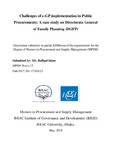Challenges of e-GP implementation in public procurements: a case study on directorate general of family planning (DGFP)

View/
Date
2018-05Publisher
BRAC UniversityAuthor
Islam, Md. RafiqulMetadata
Show full item recordAbstract
To envision the Government‟s Vision 2021 as well as to materialize the concept of “Digital Bangladesh‟‟ the Government of Bangladesh (GOB) has introduced Electronic Government Procurement (e-GP) in Public procurement business process in June, 2011. It is a single platform which is working to ensure good governance in the public procurement process through ICT. The utilization of e-GP in construction sector has been widespread in Bangladesh, but to date it is consider e-GP as a new phenomenon in Goods &related services procurement. It‟s a big challenge for GOB to introduce e-GP through the all organizations. The government has a plan to improve Public procurement management & enhance monitoring capacity through digitization process. The GOB has selected 32 organisations‟ which has mandatory obligation to roll out e-GP for institutionalizing e-GP system. Directorate General of Family Planning (DGFP) is one of the organization among them which started its e-GP in very small scale in 2015.There was a large number of procurement study in manual procurement since last fifteen years in the world but the empirical study on e-GP system; especially in Bangladesh is very limited specially on Health & Family Planning related procurement in Bangladesh. Understanding the importance of such a study, I conducted a questionnaire survey regarding e-GP implementation challenges in DGFP.
The study is based on questionnaire survey regarding the user experience and perception on e-GP in DGFP. The present research study has intended to identify the present trend of manual procurement and e-GP, the gaps in procuring system especially in e-GP implementation and find out the way forward process. It has also an objective to analyses the present traditional procurement status comparing with e-GP. A conceptual framework has been developed through different literature review as well as secondary data analysis and that has subsequently been tested with collected primary data from the procurement personnel of DGFP. The study applies a purposive sampling technique to receive the research objectives regarding the e-GP in DGFP. The results indicate that at present all procurement personnel‟s of DGFP are not well groomed in e-GP system, they have shortages of sufficient logistics support. They are facing several numbers of challenges like lack of skilled manpower on e-GP system; lack of willingness to use e-GP system by Top Management, lack of knowledge of tenderer and lack of high speed internet connectivity. This study consider both manual(traditional) procurement and e-GP .Despites these challenges, e-GP system have been achieving a wider level of acceptance among tenders as well as among procuring entities in DGFP and other organisations‟ in Bangladesh. Users have strong perception on e-GP system
P a g e | xi
to ensure transparency and accountability in public procurement as e-GP system increased performance and quality, reduce cost by increasing efficiency. This study will helpful for the government organizations that are going to roll out e-GP system in their public procurement.
